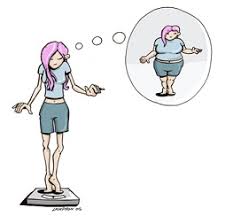Insight to Eating Disorders!
Eating disorders are real, complex medical and psychiatric illnesses that can have serious consequences for health, productivity and relationships. People struggling with an eating disorder often become obsessed with food, body image and/or weight. These disorders can be life-threatening if not recognized and treated appropriately.
Types of Eating Disorders :
The three most common types of Eating Disorders are :
1) Anorexia Nervosa - Have an obsessive fear of gaining weight, refusal to maintain a healthy body weight and an unrealistic perception of body image. Such people fiercely limit the quantity of food they consume and view themselves as overweight, even when they are clearly underweight.
2) Bulimia Nervosa- Characterized by repeated binge eating followed by behaviors that compensate for the overeating, such as forced vomiting, excessive exercise, or extreme use of laxatives or diuretics. The binge-eating and purging cycle is typically done in secret, creating feelings of shame, guilt, and lack of control.
3) Binge Eating Disorder- Individuals who suffer from Binge Eating Disorder will frequently lose control over the eating. The episodes of binge-eating are not followed by compensatory behaviors, such as purging, fasting, or excessive exercise.
Signs & Symptoms
* Chronic dieting despite being hazardously underweight
* Constant weight fluctuations
* Obsession with calories and fat contents of food
* Engaging in ritualistic eating patterns, such as cutting food into tiny pieces, eating alone, and/or hiding food
* Continued fixation with food, recipes, or cooking; the individual may cook intricate meals for others but refrain from eating themselves
* Depression or lethargic stage
TREATMENT
Psychotheray : Different forms of psychotherapy, such as individual, family, or group, can be helpful in addressing the underlying causes of eating disorders. Therapy is a fundamental piece of treatment because it address and heal from traumatic life events or situations and help learn healthier coping skills and methods for expressing emotions, communicating and maintaining healthy relationships.
Nutrition: This would involve weight restoration and stabilization, guidance for normal eating, and the integration of an individualized meal plan.
Medications: Some medications may be effective in helping resolve mood or anxiety symptoms that can occur with an eating disorder or in reducing binge-eating and purging behaviors.
Medical Care : The highest concern in the treatment of eating disorders is addressing any health issues that may have been a consequence of eating disordered behaviors.




+1.svg)
